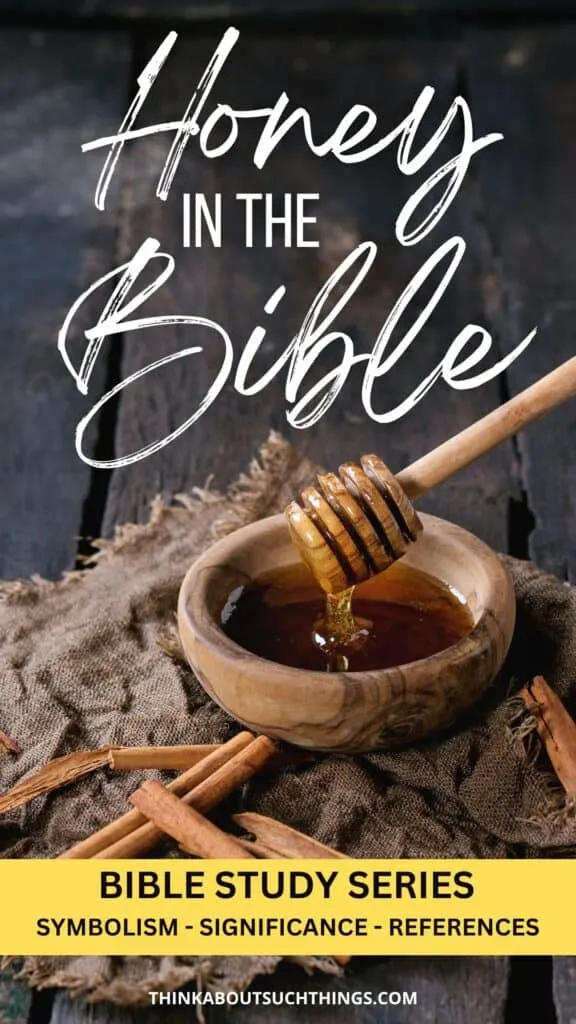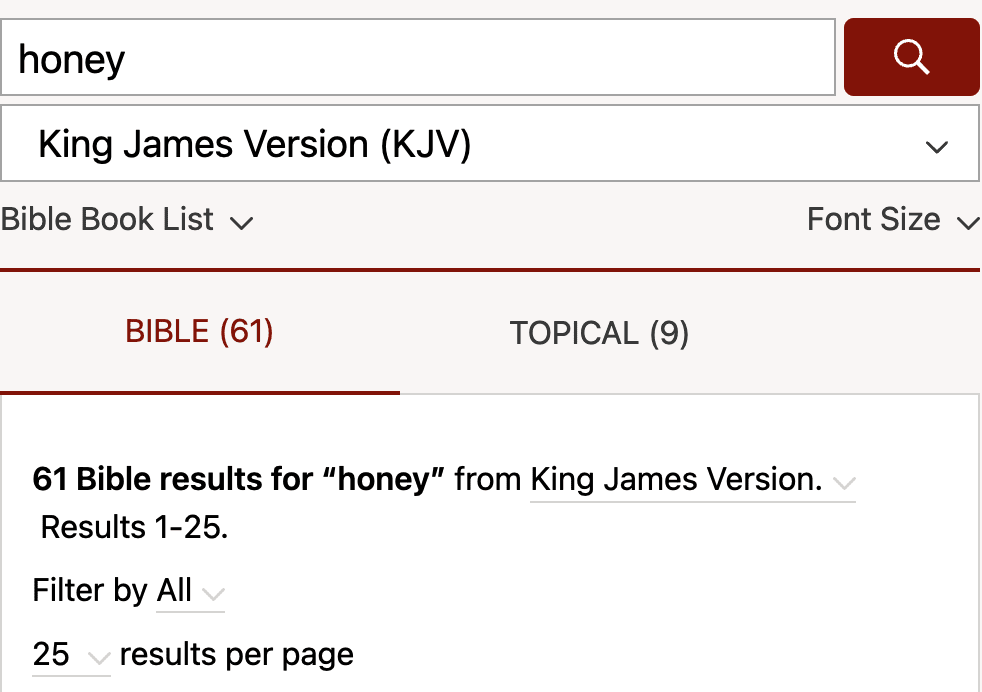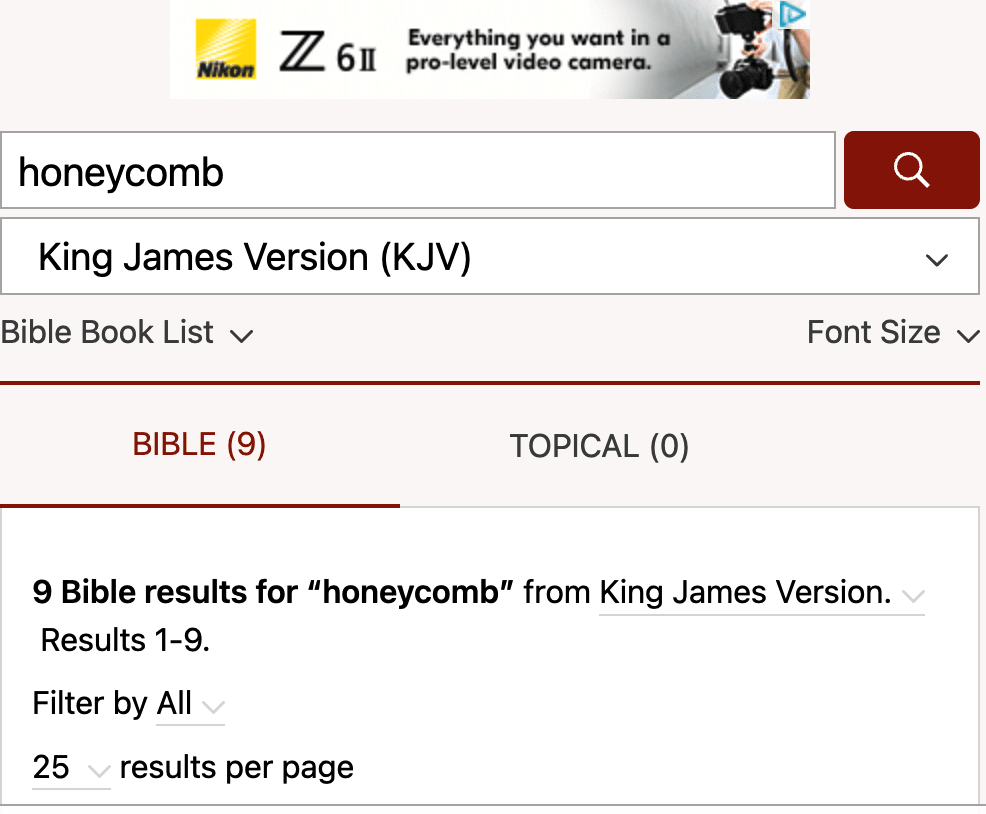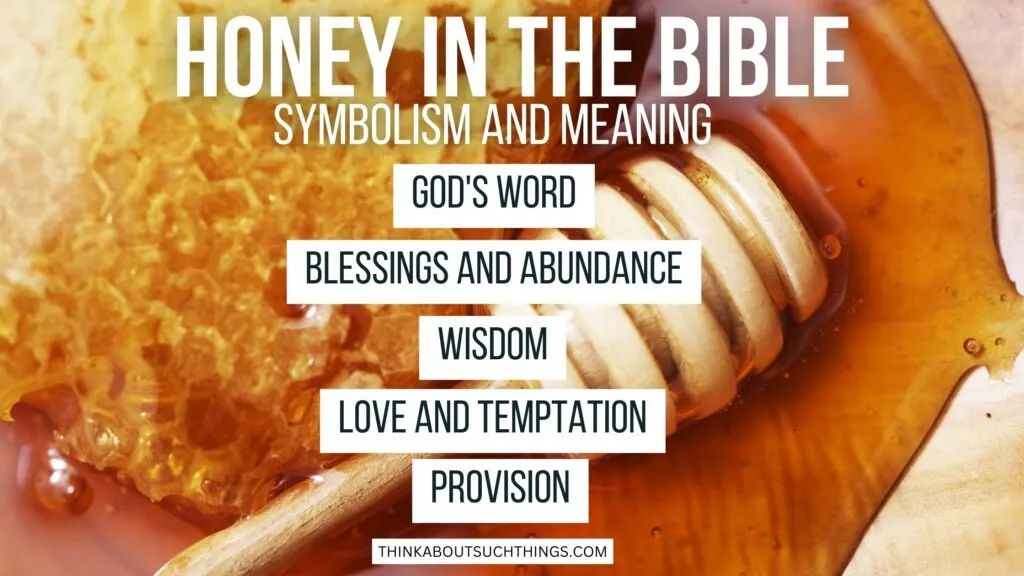In this article, we will explore the world of honey in the Bible, what it means, symbolism, references, and much more. So, grab your Bible, and let’s dive in…
When you think about honey is such an interesting food. It can’t spoil and has incredible health benefits. It’s been part of the ancient world for centuries and is still used today!
It’s crazy to think that honey has been eaten for thousands of years. While almost everything around it has changed, honey has remained a favorite sweet delight. We may have learned to farm honey and domesticate bees, but honey has remained the same for centuries.
When we read about honey in the Bible, we can relate to what is being said because honey is as familiar today as it was to the Bible characters.
Our meals may look very different from the meals David or the disciples, or Jesus ate, but honey is no less popular today than it was in the Bible times. Aside from being a sweet treat what does the Bible tell us about honey?

Honey In The Bible
When we dive into the Hebrew and Greek we can see that there various words for honey:
Yaꜥar – Honey from Bees (Hebrew)
I have come to my garden, my sister, my spouse;
I have gathered my myrrh with my spice;
I have eaten my honeycomb with my honey;
I have drunk my wine with my milk. – Song of Solomon 5:1
yaꜥar only occurs in 1 Sam. 14:25, 27, 29; Song of Solomon 5:1, where it denotes the honey of bees. Properly the word signifies a forest or copse and refers to honey found in woods.
Nopheth – Honey that Drops (Hebrew)
This is usually translated as honeycomb, and in the Strong’s Concordance, it says in the sense of shaking to pieces; a dripping i.e. of honey (from the comb):—honeycomb (Ps. 19:10; Prov. 5:3; Song 4:11).
Debash – Bee-Honey (Hebrew)
After some time, when he returned to get her, he turned aside to see the carcass of the lion. And behold, a swarm of bees and honey were in the carcass of the lion. – Judg. 14:8
This word means bee-honey (Judg. 14:8); but also frequently a vegetable honey distilled from trees (Gen. 43:11; Ezek. 27:17). In these passages, it may probably mean “dibs,” or syrup of grapes, i.e., the juice of ripe grapes boiled down to one-third of its bulk. (source)
Méli – Honey (Greek)
I’m a little fond of this translation as it’s close to my name Melissa which is Greek for honeybee.
There isn’t anything specific or unique about this greek word, it just means honey.
Here is a little more info from a popular Bible dictionary:
Smith’s Bible Dictionary (source)
Honey, The Hebrew debash in the first place applied to the product of the bee, to which exclusively we give the name of honey. All travellers agree in describing Palestine as a land “flowing with milk and honey,” (Exodus 3:8) bees being abundant even in the remote parts of the wilderness, where they deposit their honey in the crevices of rocks or in hollow trees.
In some parts of northern Arabia the hills are so well stocked with bees that no sooner are hives placed than they are occupied. In the second place the term debash applies to a decoction of the juice of the grape, which is still called dibs, and which forms an article of commerce in the East, it was this, and not ordinary bee-honey, which Jacob sent to Joseph, (Genesis 43:11) and which the Tyrians purchased from Palestine.
(Ezekiel 27:17) A third kind has been described by some writers as a “vegetable” honey, by which is meant the exudations of certain trees and shrubs, such as the Tamarix mannifera, found in the peninsula of Sinai, or the stunted oaks of Luristan and Mesopotamia. The honey which Jonathan ate in the wood, (1 Samuel 14:25) and the “wild honey” which supported John the Baptist, (Matthew 3:42) have been referred to this species. But it was probably the honey of wild bees.
Canaan was a “land flowing with milk and honey” (Ex. 3:8). Milk and honey were among the chief dainties in the earlier ages, as they are now among the Bedawin; and butter and honey are also mentioned among articles of food (Isa. 7:15).
The ancients used honey instead of sugar (Ps. 119:103; Prov. 24:13); but when taken in great quantities it caused nausea, a fact referred to in Prov. 25:16, 17 to inculcate moderation in pleasures. Honey and milk also are put for sweet discourse (Cant. 4:11).
Honey was a sweet food delight used to celebrate special feast days. Apple is dipped in honey on Rosh Hashana to represent a good and sweet new year. Honey is also mentioned as food when Samson ate honey from a bee hive in the bones of a lion he killed. The Bible also tells us about the nourishing ability of honey when Jonathan ate a little honey during a battle, and the honey renewed his strength.
John the Baptizer’s meager diet consisted of wild honey and locusts, yet it was enough to sustain him. Honey is an excellent food and energy source. Jesus also ate honey to sustain Himself after His resurrection. We read in Luke that the disciples gave Jesus fish and a honeycomb as a meal.
In the Bible, honey was served as part of a meal to show honor to guests. We see this when the children of Ammon provide food to David and his troops when he is fleeing Absalom’s army.
In the Bible, honey is used as a gift, showing that it is precious. We read about honey for the first time in Genesis 43:11, where Israel sent honey as a gift to the pharaoh when his sons went to buy grain in Egypt. Honey was also a gift from Jeroboam’s queen to the prophet Ahijah.
How Many Times Is Honey Mentioned In The Bible?
Honey is mentioned 61 times within the King James Version. This will include additional terms like honeycomb.

Honeycomb in the Bible
The fear of the Lord is clean, enduring for ever: the judgments of the Lord are true and righteous altogether. More to be desired are they than gold, yea, than much fine gold: sweeter also than honey and the honeycomb. – Psalm 19:9-10
Have you ever seen a beehive up close? If you have, you may have noticed an intricate and beautiful structure that resembles a hexagon! This structure, known as honeycomb, is made by bees to store their honey. The way bees create honeycomb is fascinating – they actually secrete wax from their bodies and use it to build the comb.
Now, honeycomb is mentioned 9 times in the King James Version of the Bible. The word used in Hebrew is Tsuph.

Honeycomb is a symbol of sweetness, nourishment, and even wisdom. In the Old Testament, it is described as a food that is desirable and good. For example, in Proverbs 24:13-14, it says…
My son, eat thou honey, because it is good; and the honeycomb, which is sweet to thy taste: So shall the knowledge of wisdom be unto thy soul: when thou hast found it, then there shall be a reward, and thy expectation shall not be cut off.
In our modern times, we know now how healthy and nutritious honeycomb is. It can help fight infections and more. But in the same book of Proverbs, we see how “sweetness” doesn’t always mean something good.
For the lips of an immoral woman drip honey,
And her mouth is smoother than oil;
4 But in the end she is bitter as wormwood,
Sharp as a two-edged sword. – Proverbs 5:3-4
In the New Testament, honeycomb is only mentioned once after the resurrection appearance to His disciples in Luke 24.
What Does Honey Symbolize In The Bible?
Honey is always spoken of with high regard in the Bible as a delight and something of value. Honey was a treat, not eaten every day like we do. Honey was also more than food. It held a higher value physically and symbolically.

Honey Symbolizes God’s Blessings And Abundance
God spoke to Moses from the burning bush and instructed him to return to Egypt and lead God’s people out of slavery. God described Canaan as a good and large land. God describes Canaan as a land that flows with milk and honey.
God was making it clear to Moses that the land He had promised Abraham hundreds of years before was fruitful.
God did not intend to take the Israelites out of slavery to let them have a so-so life elsewhere. He certainly did not intend for them to perish in the desert.
God had prepared a land where food grew abundantly. Canaan would provide plenty of grazing for the Israelite herds to produce ample milk. He wanted to bless His people generously.
Honeybees need to visit around two million flowers in order to produce a pound of honey. For honey to flow in this new land, there would need to be many flowers from many different crops.
God was telling Moses that there would be no lack. We can read this same promise four more times in Leviticus, Numbers, Deuteronomy, and Joshua.
We read in Exodus 16:31 that the manna that God provided as food for the Israelites tasted like honey wafers. Perhaps God wanted to keep reminding them to look forward to the abundant honey in the land they had been promised.
God showed His Blessing through the honey-flavored manna even while the nation was being punished for lacking faith.
Honey Is Likened To God’s Word
Honey is a delight to eat, and it is pure. Honey can be sealed up and stored for hundreds of years and will still be good to eat. It does not change or degrade.
The same is true of God’s Word. Like honey sealed in jars in a tomb for hundreds of years, scrolls containing God’s Word found in a cave centuries later contained all their original meaning and power. The Word of God, sealed up in our hearts, remains fresh and pure in the same way.
In Psalm 119:103, David likens God’s Word to the sweetness of honey.
The Bible calls David a man after God’s heart, even though he was imperfect. David loved God and took delight in learning everything God taught him.
Like honey, God’s Word in our mouth is sweet and can soothe or bring healing to those around us. Of course, this comparison is symbolic, but we also read two accounts where God instructs prophets to eat a scroll.
In Ezekiel 3:3, God has a message for Israel. God has Ezekiel eat a scroll with His words and message to His people. Ezekiel tells us the taste of God’s Words was sweet as honey to him. The same is true of the scroll John ate in Rev 10:9-10. Even though the scroll John ate made his stomach feel bitter, God’s Word is always sweet in our mouth.
Wisdom Is Sweet As Honey
Solomon knew something about wisdom because he received wisdom as a gift from God. Solomon likens wisdom to honey in Proverbs 24. Just as Solomon received wisdom from God, we can glean wisdom from God’s Word.
Golden Honey And God’s Word
We find one of the most beautiful scriptures about honey in Palm 19:10. David declares that God’s law is more precious than gold and sweeter than honey. A superficial reading of this verse does not mean much to us, but delving into the Hebrew meaning of the words gives this text a whole new meaning.
In this verse, David speaks about gold (zahav) and fine gold (pazaz). Modern-day calculations of David’s wealth estimate that he possessed significantly more gold than the United States of America’s reserves, so he knew about gold.
To understand what David meant by mentioning two types of gold, we must look at the Hebrew use of these two forms.
Zahav gold was refined and purified gold used chiefly as a currency. Pazaz, or fine gold, is also refined and purified, but it is also polished to show its beauty. This fine gold was used in the Tabernacle, the Temple, or for jewelry.
Both forms of gold represent purification, wealth, and power, but fine gold adds beauty, worship, glory, and a foreshadowing of heaven.
David is telling us that God’s Word within us purifies us from sin. The Word of God is valuable in a way that exceeds the monetary value, and His Word is more than just beautiful words. It is valuable in an eternal heavenly sense.
God’s laws are more desirable than physical earthly things, as they pave the way for an eternity where we will walk the heavenly streets of gold.
In this verse, David also likens the sweetness of God’s statutes to honey and honeycomb. The first honey David mentions was removed from the comb and contained in a jar.
Honey still in the comb is sweeter and more highly favored. The word used for honeycomb in this passage comes from the Hebrew word suph, which means to overflow.
Both honey and honeycomb are delicious and a delight. Both can be used as medicine, yet David states that God’s Word holds more delight and benefit to us than honey or honeycomb. We should be like a honeycomb overflowing with God’s Word.
Honey straight from the comb is not diluted. It is pure, just like the fine gold David speaks of. It is God’s Word at work in us that has this effect.
Honey in the Bible holds many messages for us. We can see that God has provided honey as a gift. Our God, who does not eat or need to be sustained, gave us honey as a food that tastes wonderful and is nutritious. In the same way, God gave us His Word to sustain us spiritually, and Jesus, the Word become flesh, was given as a gift of salvation.
God told Moses He had prepared a land that flows with milk and honey for His children. Just as Canaan was the promised land that was an inheritance after their time of wandering through the wilderness, heaven is our promised land.
A new home without lack, with golden streets and streams of living water to look forward to after this sinful wilderness is left behind.

Melissa is a passionate minister, speaker and an ongoing learner of the Bible. She has been involved in church and vocational ministry for over 18 years. And is the founder of Think About Such Things. She has the heart to equip the saints by helping them get into the Word of God and fall more in love with Jesus. She also enjoys family, cooking, and reading.
She has spoken in churches in California, Oregon, Texas, and Mexico and has been featured in Guidepost Magazine and All Recipes Magazine. Read More…
